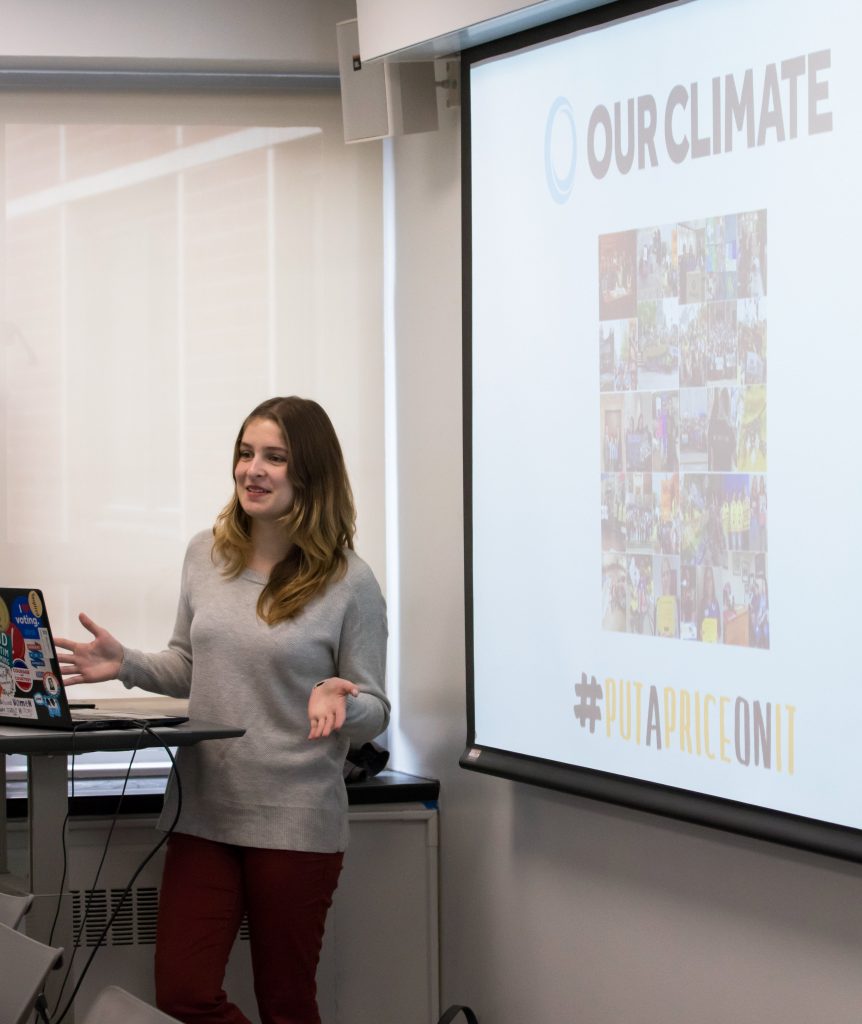
In an effort to educate students on climate change and its potential remedies, Our Climate, a nonprofit organization that aims to mobilize and empower the generations most affected by climate change, hosted a workshop on Friday afternoon.
The “Climate Policy, Advocacy & Storytelling Workshop,” held in the Harpur Edge office, was geared toward informing and encouraging students and elected officials to take action on policies that can help New York state address climate change. Specifically, much of the event focused on the importance of establishing equitable carbon pricing.
Carbon pricing, a method favored by many economists for reducing global warming emissions, charges those who emit carbon dioxide for their emissions. That charge, called a carbon price, is the amount that must be paid for the right to emit one ton of carbon dioxide into the atmosphere.
Nicole Crescimanno, New York state director at Our Climate, said without carbon pricing, emissions are continuously being put into the atmosphere, causing climate change, which comes with severe health and weather impacts.
“We pay for our garbage to be taken away, but right now we’re trashing our planet for free,” Crescimanno said. “If we price carbon, it’ll make fossil fuels more expensive.”
The desired outcome, according to Crescimanno, would be an increase in the cost of fossil fuels, therefore incentivizing renewable energy like hydroelectric dams and windmills.
“Putting a price on carbon could raise our electricity bills in the short run,” Crescimanno said. “But, let’s say it goes up $10 a month, you will get the $10 back through the cheaper, potential renewable energy infrastructure.”
Allison Romer, a fellow and campus leader for Our Climate at Binghamton University and a senior double-majoring in environmental studies and political science, said carbon taxing is also a flexible system and can be tailored to meet the needs of local or state economies.
“Carbon taxing is easier to implement, is more flexible and, most importantly, more economically fair,” Romer said.
According to Crescimanno, the carbon pricing system has several pricing mechanisms besides carbon taxing, such as cap and trade. A cap-and-trade system limits the quantity of carbon emitted and allows the price to fluctuate in response.
The workshop also expanded beyond the carbon pricing method and taught attendees how to effectively speak with elected officials about climate change. Currently, there are two climate bills that Our Climate is advocating for at the state level, including the New York State Climate and Community Protection Act, which would establish a climate action council in the state and require the New York State Department of Environmental Conservation to implement additional regulations and reporting requirements.
“Climate change is such a complex and overwhelming issue, that people tend to shy away from the idea,” Romer said. “I am here to give people hope and an easy, tangible way to get involved. Meet with your local state senator, and tell him or her about the act and what it personally means to you.”
Romer and Crescimanno emphasized the importance of sharing a personal experience when meeting with an elected official, especially when trying to convince them to pass a bill.
“You first have to think about what your climate story is,” Romer said. “Chances are, they don’t want to just listen to facts. They want to hear about your personal anecdotal evidence — why you specifically care.”
Since the workshop aimed to be interactive and hands-on, attendees were encouraged to ask questions and share their personal experiences with climate change.
Michelle Sherman, a junior majoring in accounting, said she felt encouraged to do her part in getting the New York State Climate and Community Protection Act fully enacted by 2019 after attending the event.
“I grew up as a kid in a city that was incredibly polluted,” Sherman said. “I always wanted to be the one who could help make a difference, but I never really knew how, until now.”


